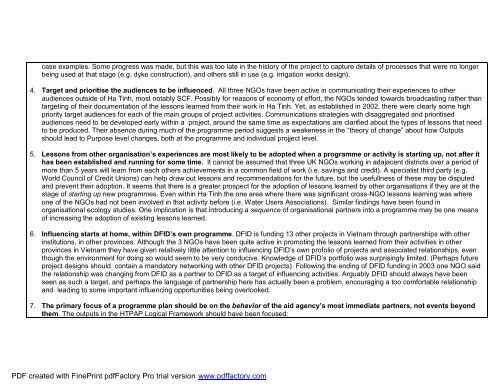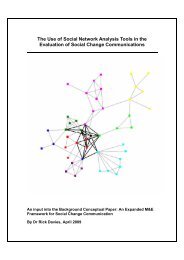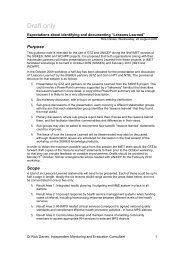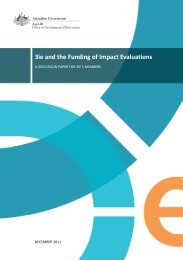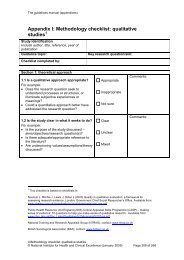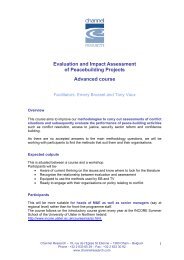DFID 2003 Ha Tinh PCR.pdf - Monitoring and Evaluation NEWS
DFID 2003 Ha Tinh PCR.pdf - Monitoring and Evaluation NEWS
DFID 2003 Ha Tinh PCR.pdf - Monitoring and Evaluation NEWS
Create successful ePaper yourself
Turn your PDF publications into a flip-book with our unique Google optimized e-Paper software.
case examples. Some progress was made, but this was too late in the history of the project to capture details of processes that were no longer<br />
being used at that stage (e.g. dyke construction), <strong>and</strong> others still in use (e.g. irrigation works design).<br />
4. Target <strong>and</strong> prioritise the audiences to be influenced. All three NGOs have been active in communicating their experiences to other<br />
audiences outside of <strong>Ha</strong> <strong>Tinh</strong>, most notably SCF. Possibly for reasons of economy of effort, the NGOs tended towards broadcasting rather than<br />
targeting of their documentation of the lessons learned from their work in <strong>Ha</strong> <strong>Tinh</strong>. Yet, as established in 2002, there were clearly some high<br />
priority target audiences for each of the main groups of project activities. Communications strategies with disaggregated <strong>and</strong> prioritised<br />
audiences need to be developed early within a project, around the same time as expectations are clarified about the types of lessons that need<br />
to be produced. Their absence during much of the programme period suggests a weakeness in the “theory of change” about how Outputs<br />
should lead to Purpose level changes, both at the programme <strong>and</strong> individual projject level.<br />
5. Lessons from other organisation’s experiences are most likely to be adopted when a programme or activity is starting up, not after it<br />
has been established <strong>and</strong> running for some time. It cannot be assumed that three UK NGOs working in adajacent districts over a period of<br />
more than 5 years will learn from each others achievements in a common field of work (i.e. savings <strong>and</strong> credit). A specialist third party (e.g.<br />
World Council of Credit Unions) can help draw out lessons <strong>and</strong> recommendations for the future, but the usefullness of these may be disputed<br />
<strong>and</strong> prevent their adoption. It seems that there is a greater prospect for the adoption of lessons learned by other organisations if they are at the<br />
stage of starting up new programmes. Even within <strong>Ha</strong> <strong>Tinh</strong> the one area where there was significant cross-NGO lessons learning was where<br />
one of the NGOs had not been involved in that activity before (i.e. Water Users Associations). Similar findings have been found in<br />
organisational ecology studies. One implication is that introducing a sequence of organisational partners into a programme may be one means<br />
of increasing the adoption of existing lessons learned.<br />
6. Influencing starts at home, within <strong>DFID</strong>’s own programme. <strong>DFID</strong> is funding 13 other projects in Vietnam through partnerships with other<br />
institutions, in other provinces. Although the 3 NGOs have been quite active in promoting the lessons learned from their activities in other<br />
provinces in Vietnam they have given relatively little attention to influencing <strong>DFID</strong>’s own profolio of projects <strong>and</strong> associated relationships, even<br />
though the environment for doing so would seem to be very conducive. Knowledge of <strong>DFID</strong>’s portfolio was surprisingly limited. (Perhaps future<br />
project designs should contain a m<strong>and</strong>atory networking with other <strong>DFID</strong> projects). Following the ending of <strong>DFID</strong> funding in <strong>2003</strong> one NGO said<br />
the relationship was changing from <strong>DFID</strong> as a partner to <strong>DFID</strong> as a target of influencing activities. Arguably <strong>DFID</strong> should always have been<br />
seen as such a target, <strong>and</strong> perhaps the language of partnership here has actually been a problem, encouraging a too comfortable relationship<br />
<strong>and</strong> leading to some important influencing opportunities being overlooked.<br />
7. The primary focus of a programme plan should be on the behavior of the aid agency’s most immediate partners, not events beyond<br />
them. The outputs in the HTPAP Logical Framework should have been focused:<br />
PDF created with FinePrint <strong>pdf</strong>Factory Pro trial version www.<strong>pdf</strong>factory.com


